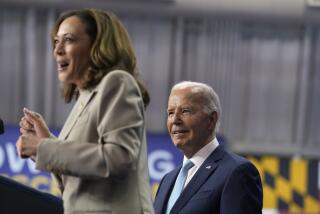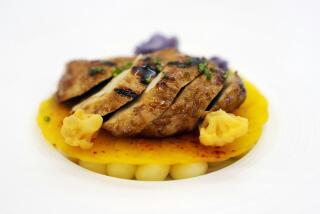Ross Perot Got It Wrong. : In Arkansas, Don Tyson Is the Real Chicken Man
- Share via
SPRINGDALE, Ark. — When Don Tyson travels to Washington for his pal Bill Clinton’s inauguration later this month, he’ll have to leave the Oval Office to do it.
Tyson, the man behind the chickens that have become emblematic of the incoming President’s Arkansas roots, operates from a replica of the White House Oval Office that he ordered built at the headquarters of his Tyson Foods in the late 1970s.
He says his unusual sanctum was inspired by Jimmy Carter’s election to the presidency: “He was a friend of my chicken friends in Georgia.” And Tyson was on the move himself, transforming a family business into the poultry industry’s unchallenged cock o’ the walk.
Tyson’s Oval Office has a distinct chicken flavor. A rooster’s likeness is carved into the Arkansas white oak over the fireplace, and the door knobs are shaped like chicken eggs. In the adjacent office is a bronzed egg carton.
In other words, Ross Perot had the wrong guy when he called Clinton “chicken man” during last fall’s presidential campaign.
While it’s true that low-tech chicken jobs had plenty to do with Arkansas’ rapid job growth under Clinton, the real chicken man is Tyson, 62, an aw-shucks country boy credited with leading the flinty chicken industry into the modern corporate era--complete with a string of 20 takeovers in 20 years.
Tyson is all Arkansas, part of a heritage that--in addition to various political overachievers--has produced such noteworthy businessmen as financier Jack Stephens of Little Rock (worth more than $900 million, placing him ahead of Tyson on Forbes magazine’s list of richest Americans) and the legendary Sam Walton, founder of Wal-Mart Stores, who recently died, leaving $25 billion behind.
In fact, political kingpin Stephens helped bankroll Walton and Tyson over the years, illustrating the sort of close ties among leading Arkansans that prompted criticism of Gov. Clinton. He was accused of being too chummy with outfits such as Tyson Foods, handing out tax breaks and going easy on environmental regulations.
But when Perot ridiculed an economic culture of “chicken pluckers”--figuratively holding his nose at the mention of a barnyard low-life that has come to symbolize cowardice, ignorance and worse--he may have missed the mark.
“Tyson’s a huge, modern business,” says Prof. James Combs, an expert on politics and culture at Valparaiso University in Indiana. “It’s really no different than Perot’s high-powered computer company--except for the association between chickens and backwardness, illiteracy and Ma and Pa Kettle that makes it supposedly inferior to high technology. It’s an invidious charge.”
A self-described liberal Democrat and proud Arkansas loyalist, Tyson built a $4-billion enterprise that has made him one of the nation’s wealthiest men. Tyson Foods grew along with America’s love of cheap, low-fat chicken in the 1970s and 1980s, when per-capita consumption of the bird jumped from 40 to more than 70 pounds annually--almost 90 pounds in California.
Indeed, admirers say Tyson’s acumen helped chicken to rival beef at the center of America’s dinner plate. As Clinton managed to do politically with his down-home homilies and Oxford University chums, Tyson has helped the lowly chicken straddle both the downscale and the upscale. Take your choice: lard-fried chicken or mesquite-grilled capon with raspberry chutney.
He also produces pork and beef, and now has acquired a seafood company--all en route to his target of $8 billion in sales by 1995.
“We’re going to have to catch at least one more big fish,” says Tyson, a compact, buoyant, quick-to-smile man who wears a khaki uniform to work with a “Don” patch over the shirt pocket.
His Tyson Foods, headquartered here in northwest Arkansas, has been fighting off some alligators lately: union organizers, unhappy growers, environmentalists and some who object to his political clout.
But a recent collapse in the price of the corn that Tyson feeds the chickens makes it all easier to bear. Tyson is the nation’s biggest buyer of corn.
Wall Street’s handful of poultry followers wax almost poetic at Tyson Food’s acquisitions--a binge that landed the company 25% of the nation’s chicken business.
Analysts are also impressed by Tyson’s production flexibility, which rivals that of Japanese car makers, and by the firm’s development and marketing of the “further processed chicken”: deboned, flavored, breaded, frozen; your chicken pot pie, chicken hot dog, or chicken bologna. Not to mention the landmark Chicken McNugget--or, way back in 1972, the first mass-produced frozen chicken ready for the microwave oven.
By controlling the system from breeding to marketing and turning the simple chicken into more than 300 products with fixed prices, Tyson shielded itself from the historical volatility in prices of plain whole chickens. Those now account for just 15% of the firm’s sales.
The process put Tyson on Forbes and Fortune magazines’ lists of the top 10 publicly held companies in return on shareholders’ investment in the 1980s: an average 37%. The stock price soared 3,300%.
In Arkansas--a poultry-growing region by default since the 1920s because so much of the soil is poor--the success of Tyson Foods and other poultry processors has created about 30,000 new jobs in the last decade. People have been put to work in the processing plants, feed mills, hatcheries and upward of 10,000 chicken houses that dot the landscape.
Tyson, whose 1.5 billion chickens a year puts it ahead of such competition as ConAgra and Cargill, has 23 of its 59 plants in Arkansas and 21,000 of its 52,000 employees. More than half its customers are restaurant chains--it has one plant devoted to Kentucky Fried Chicken’s new “crispy” chicken, another to McDonald’s restaurants--and institutional customers such as colleges and the military.
(By comparison, all the producers combined in California--the biggest consumer of chicken--turn out 250 million birds a year, part of a $2-billion local industry dominated by Foster Farms and Zacky Farms. Tyson and others with a broad geographic reach ship frozen poultry products to all the major California supermarket chains.)
Not that Tyson--or humankind for that matter--did all this alone.
Credit accrues to the chickens themselves, past and present--including the ones Don Tyson’s father hauled by non-refrigerated truck to Chicago, Kansas City and Detroit in the 1930s, inventing an in-transit feeding system that gave him a bigger territory than other truckers.
Tyson Foods and its competitors--many of which it later bought--created the breeding, feeding, slaughtering, marketing and other systems that today move chickens from hatchery to slaughterhouse in as little as 28 days. It used to take three to four months.
Other changes in the industry are just as dramatic. It takes eight minutes’ labor to produce 100 pounds of chicken today, versus five hours in 1949. And in just the last decade, prices have been driven down 40%, in real terms.
Tyson--with his son, John, the operations vice chairman--runs what remains a family-controlled empire. The senior Tyson is worth an estimated $790 million through holdings in Tyson Foods that give his family more than 51% control.
Chatting happily about chickens--explaining, for example, why chicken meat freezes at 26 degrees instead of 32 degrees--Tyson hardly seems to be a schemer. But he does have a habit of surrounding himself with the politically attuned and has tied the company closely to the communities where it operates, chiefly in Arkansas.
Public-relations man Archie Schaffer III was a longtime aide to former Gov. and now Sen. Dale Bumpers, who was instrumental in getting $10 million from Congress for a “Poultry Center of Excellence” research facility at the University of Arkansas in adjacent Fayetteville. Tyson Foods’ general counsel, James Blair, is a close friend of Clinton’s and husband of Diane Blair, a top aide in Clinton’s presidential campaign.
But Arkansas is a small state, everybody knows everybody else, and it’s his duty and right to get involved politically, Tyson reasons.
Besides, the company notes, only nine of Gov. Clinton’s estimated 200 flights on corporate aircraft during his governorship were via Air Tyson.
“All this stuff has been overplayed,” Schaffer says.
Recalls Tyson: “I put 1,100 jobs in Pine Bluff (Ark.) because Bill Clinton came to me and said he needed the jobs. He was doing what all governors do.”
The state of Kentucky was offering nearly four times the $5 million of incentives that Clinton was able to cough up, Tyson says. But he put a factory in Pine Bluff instead “because it was Arkansas.”
More to Read
Inside the business of entertainment
The Wide Shot brings you news, analysis and insights on everything from streaming wars to production — and what it all means for the future.
You may occasionally receive promotional content from the Los Angeles Times.










